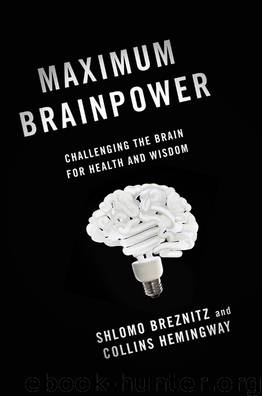Maximum Brainpower by Shlomo Breznitz

Author:Shlomo Breznitz [Hemingway, Shlomo Breznitz and Collins]
Language: eng
Format: epub
ISBN: 978-0-345-52616-8
Publisher: Random House Publishing Group
Published: 2012-06-25T16:00:00+00:00
STRESS: WE KNOW IT WHEN WE FEEL IT
“Stress” is one of those concepts that everyone understands yet no one can easily define. Though humans respond to stress in the same way physiologically, we all respond to different kinds of stress and different levels of stress. A loud noise that sends one person through the roof might be barely noticed by someone else. A new job that excites one person could terrify another. Some people enjoy airplane rides and others are reduced to tears. Because our emphasis is on the stress created by change, we will return to the original definition coined in 1936 by Hans Selye, who pioneered stress research. He defined stress as the “non-specific response of the body to any demand for change.”
To a certain extent, stress is positive. In order to flourish, we need to function at an optimal level of psychological stimulation. Though that optimal level varies from person to person, we all suffer the same symptoms if under-aroused: We get bored. Boredom feels psychologically painful. Bored employees are roughly as stressed as overworked employees. Without sufficient stimulation, we tend to fall asleep. When we want to pay attention while reading a boring book or attending a boring lecture, we will often touch the skin of our face or lips with our fingertips or stroke our hair to make ourselves more alert. These fidgety behaviors are evident in any library. I once made a movie of these actions with a hidden camera. It was like watching monkeys grooming themselves. We need stimulation to stay awake.
“Eustress” (“good stress”) is a word coined by Selye to describe stress that stimulates performance. The stress that precedes a major physical or mental competition helps activate our bodies and focus our minds so we can gather our resources and deliver our best efforts. Whether we are trying to run a four-minute mile or achieve a perfect score on a college admissions examination, preparation plus a bit of fear can be a productive combination. Eustress challenges us to develop our potential. External factors key us up rather than bring us down. But eustress still taxes the body just as any other stress does. We cannot “peak” for physical or mental competitions every day. We will wear ourselves out.
In evaluating the impact of stress, what matters is not the absolute level of stress but the change in stress from a person’s baseline (the level to which he or she is accustomed). For someone who grew up in a large city, the blare and commotion is normal. For someone who is used to a quiet rural area with a traditional lifestyle, just being in a city can be extremely stressful. A person whose first major job is in a hectic, high-growth, 24/7 industry will consider a frenetic pace normal. A person who works in a quieter, slower-paced work environment, and then transfers into a high-growth industry, can suffer debilitating stress. One high-tech manager says that his major job is to teach new employees that
Download
This site does not store any files on its server. We only index and link to content provided by other sites. Please contact the content providers to delete copyright contents if any and email us, we'll remove relevant links or contents immediately.
The Art of Thinking Clearly by Rolf Dobelli(10489)
Mindhunter: Inside the FBI's Elite Serial Crime Unit by John E. Douglas & Mark Olshaker(9343)
Change Your Questions, Change Your Life by Marilee Adams(7782)
Nudge - Improving Decisions about Health, Wealth, and Happiness by Thaler Sunstein(7707)
Mastermind: How to Think Like Sherlock Holmes by Maria Konnikova(7347)
The Power of Now: A Guide to Spiritual Enlightenment by Eckhart Tolle(5781)
Men In Love by Nancy Friday(5240)
Altered Sensations by David Pantalony(5104)
Factfulness: Ten Reasons We're Wrong About the World – and Why Things Are Better Than You Think by Hans Rosling(4742)
The Confidence Code by Katty Kay(4260)
Thinking in Bets by Annie Duke(4227)
Man and His Symbols by Carl Gustav Jung(4137)
The Worm at the Core by Sheldon Solomon(3487)
Why Buddhism is True by Robert Wright(3453)
Liar's Poker by Michael Lewis(3449)
Three Women by Lisa Taddeo(3433)
The Inner Life of Animals by Peter Wohlleben(3319)
Descartes' Error by Antonio Damasio(3279)
How Music Works by David Byrne(3270)
